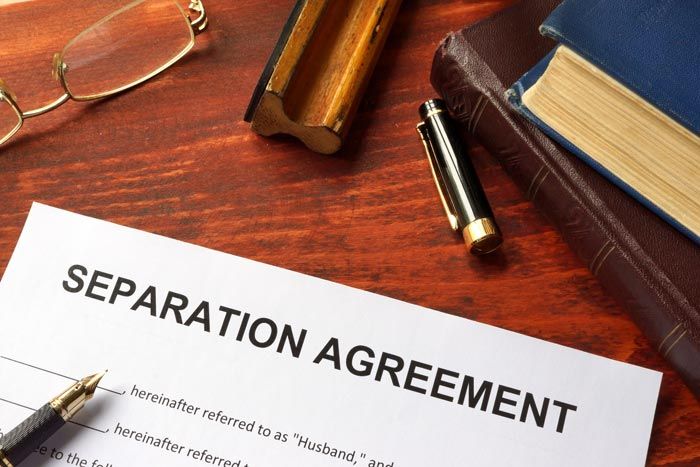SHOULD YOU AND YOUR SPOUSE CONSIDER LEGAL SEPARATION?
- By Admin, Thursday, December 28, 2017 10:54 AM
- •
- 17 Sep, 2018
- •

This type of separation is more than just an informal trial period when one of you moves into another home for a few months. Instead, it requires a legal agreement that outlines yours and your spouse's fiscal and child-rearing responsibilities during your separation.
Legal separation isn't as well understood as divorce is. Below, we'll introduce you to what legal separation is and explain whether it could work for you.
WHAT'S THE DIFFERENCE BETWEEN LEGAL SEPARATION AND DIVORCE?
The main difference between divorce and legal separation is that with the latter, you're still legally married. Otherwise, legal separation and divorce entail many of the same processes.
They both require you to draft a legal document that lays out yours and your partner's financial responsibilities during the separation. They also both divide your assets and establish child custody and support during the separation period.
WHY CHOOSE LEGAL SEPARATION OVER DIVORCE?
There are a few reasons why some couples choose to stay married but become legally separated rather than divorce:
- You need to stay on your partner's health insurance plan.
- You and your spouse need the tax benefits associated with marriage.
- You aren't sure whether you want to divorce yet.
- You don't believe in divorce (for instance, because of your religious beliefs).
If you foresee yourself getting back together with your partner but need some time apart to reassess your situation and ensure a continued marriage is what you want, then a legal separation will protect yours, your spouse's, and your children's rights during the trial period.
WHEN SHOULD YOU CHOOSE DIVORCE INSTEAD?
You should consider divorcing if:
- You believe you and your spouse have irreconcilable issues.
- You want to marry someone else. You have an abusive spouse.
In other words, if you're fairly certain your marriage is about to end - or if you know it should end for your children's safety, health, and happiness - go ahead and choose divorce over legal separation. You'll go through some of the same processes, but the legal obligations for both partners will be longer lasting.
Bear in mind that if you're legally separated, you're still legally married. That means attempting to marry someone else while you're legally separated is bigamy, which is illegal and prosecutable. If you want to pursue another marriage, definitely choose divorce over legal separation.
DO YOU REALLY NEED A LAWYER FOR LEGAL SEPARATION?
As mentioned above, a legal separation is different from an informal separation period. Instead of simply agreeing with your spouse that you should try some time apart for both of your sakes, a legal separation includes a binding legal document that outlines your marital status and your parental and spousal obligations.
Even though legal separation might feel more temporary than a divorce, it's important to have a lawyer on your side as you draw up the documents for your separation. As you divide up your assets and make crucial child care decisions, you need a trusted attorney who can protect your rights and make sure you and your children maintain the same fiscal quality of life you enjoyed before the separation.
You can certainly attempt a casual separation without a binding agreement, but relationships can disintegrate over the course of a separation. If things go south, you don't want to be left without the money and support you need to survive.
If you live in the Temple area, James M. Whorley is here to help. Whether you're considering a legal separation or a divorce, schedule a consultation so we can get to work protecting your rights.

You do not necessarily have to be on your deathbed before thinking about a will. You should get this document taken care of as soon as possible just in case. There are numerous benefits to having a comprehensive will , and you do not want to leave this Earth without having all your affairs in order.

Child custody laws and statutes are put in place by individual states. Understanding the nuances of child custody in each state is vital when seeking it. Texas is a perfect example of a state where child custody laws should be thoroughly investigated by those seeking custody.
- Terminology - In Texas, custody is interchangeable with the term conservatorship. While the term conservatorship is used in many other states, it is generally associated with anyone other than direct descendants. However, in Texas conservatorship includes children as well.
- Acronyms - There are several terms in Texas child custody cases that are merely referred to by their acronyms. While these acronyms are not difficult to differentiate, having a working knowledge of them can eliminate common confusion. For example, JMC stands for Joint Managing Conservators.
- Appointment - In Texas, in order for a custody order to legal and bona fide, it has to be processed through the courts. Though temporary guardianship can be approved through power of attorney, without an official court order, both parents have identical rights to children.
Child custody can often be one of the most contentious battles in a divorce settlement. For more information on child custody laws in Texas, call James M. Whorley at 254-742-0420.

It is not uncommon for circumstances to change after a divorce. When this happens, the involved parties may want to make changes to custody and support decrees. To move forward, the party seeking those modifications must show that the changes to the circumstances are significant and will continue. The changes that might prompt modification include:
- Relocation of one party to another state
- Significant income changes
- Concerns relating to the care and safety of minor children




Before you decide to get behind the wheel of a vehicle while under the influence, you should really consider exactly what it could cost you - aside from the fact that you could cause a deadly accident. If you are not ready to spend thousands of dollars, you may want to think twice before driving under the influence.
Attorney's fees are just the tip of the iceberg when it comes to what you will be financially responsible for. There are a variety of additional fees, fines and expenses that will come along with your defense.
The following will provide you with an idea of the kind of expenses you can expect to pay when you are convicted of a DUI. Keep in mind that exact figures are not provided because monetary amounts will vary from person to person and state to state. However, here's a general overview of what to expect.









